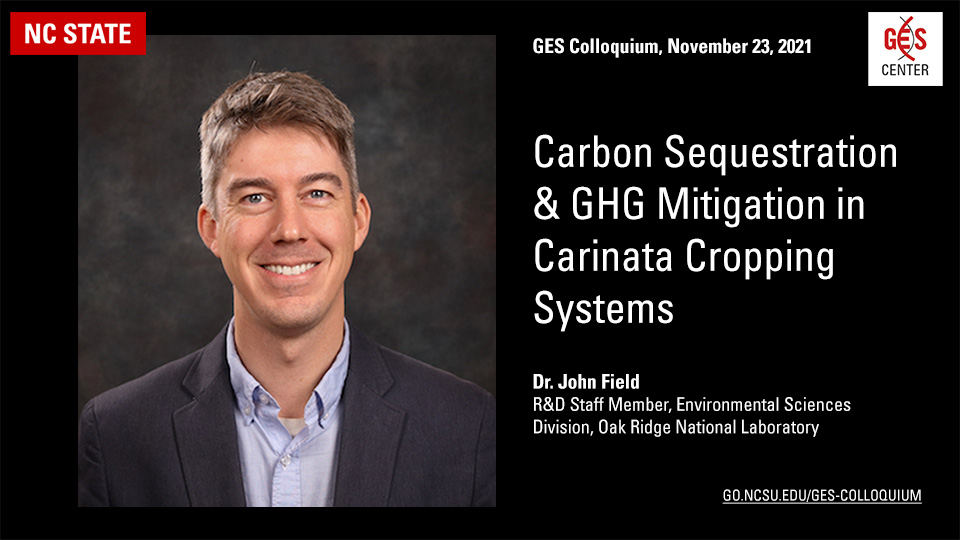
- This event has passed.
John Field – Carbon Sequestration and GHG Mitigation in Carinata Cropping Systems | GES Colloquium

Colloquium Home | Zoom Registration | GES Video Library (current) | Video Archives | Podcast | @GESCenterNCSU | Newsletter
Carbon Sequestration & GHG Mitigation in Carinata Cropping Systems
Dr. John Field, R&D Staff Member, Environmental Sciences Division, Oak Ridge National Laboratory
Ethiopian mustard (Brassica carinata) can produce substantial amounts of aviation fuel and soil carbon benefits when grown as a winter crop in the southeastern US.
Abstract
The oilseed Ethiopian mustard (Brassica carinata) has been proposed as a supplemental cash crop grown over the winter fallow season in the mild climates of the southeastern US and used as a feedstock for sustainable aviation fuel (SAF) production, with potential co-benefits for soil carbon and other ecosystem services. In this work we used a process-based ecosystem model to establish initial expectations for total regional SAF production potential and associated soil greenhouse gas (GHG) emissions when carianata is integrated into existing annual crop rotations across its frost-tolerant range in Alabama, Florida, and Georgia. We calibrated the DayCent ecosystem model based on carinata field trials in the region, and used it to evaluate the yields, soil carbon, and nitrous oxide emissions when carinata is integrated once ever third winter within those existing crop rotations. We estimate this could produce more than one billion liters of SAF annually and would be approximately neutral in terms of cropland soil GHG emissions. However, the adoption of climate-smart management techniques such as no-till establishment or organic amendments would result in a substantial soil carbon sink, significantly improving the overall environmental footprint of the resulting SAF.
Related links:
- Southeast Partnership for Advanced Rewables from Carinata (SPARC)
- A regional inter-disciplinary partnership focusing on the development of a carinata-centered bioeconomy
George, S., Seepaul, R., Geller, D., Dwivedi, P., DiLorenzo, N., Field, J., et al. (2021). GCB Bioenergy. https://doi.org/10.1111/gcbb.12828. PDF
Speaker Bio
Dr. John Field is a R&D Staff Member in the Bioresource Science & Engineering Group within the Environmental Sciences Division at Oak Ridge National Laboratory. He studies the performance of bioenergy systems at the intersection of ecosystem ecology and life cycle assessment, using process-based ecosystem models to evaluate the effect of biomass feedstock production on ecosystem carbon storage and greenhouse gas emissions. Feedstocks he has studied include switchgrass, corn stover, winter oilseed crops, and wood from trees killed by mountain pine beetle outbreaks in the Rocky Mountains. Much of his work has focused on bioenergy landscape design, including how feedstock production could be targeted on marginal lands to maximize environmental benefits. He has a particular interest in carbon-negative bioenergy systems, including carbon capture and storage technology, and pyrolysis and gasification systems that co-produce biochar. John received his BSc from Case Western Reserve University and his PhD from Colorado State University. He was previously a research scientist at the Colorado State University Natural Resource Ecology Laboratory.
GES Colloquium is jointly taught by Drs. Dawn Rodriguez-Ward and Jen Baltzegar, who you may contact with any class-specific questions. As conditions allow, colloquium will be held in-person in Poe 202, as well as live-streamed via Zoom. Please subscribe to the GES newsletter for updates (links above).
WordPress database error: [Unknown column 'wp_tec_occurrences.start_date' in 'SELECT']SELECT SQL_CALC_FOUND_ROWS wp_posts.*, CAST( wp_tec_occurrences.start_date AS DATETIME ) AS event_date
FROM wp_posts LEFT JOIN wp_term_relationships ON (wp_posts.ID = wp_term_relationships.object_id) LEFT JOIN wp_postmeta ON ( wp_posts.ID = wp_postmeta.post_id AND wp_postmeta.meta_key = '_EventHideFromUpcoming' ) LEFT JOIN wp_postmeta AS mt1 ON ( wp_posts.ID = mt1.post_id )
WHERE 1=1 AND wp_posts.ID NOT IN (16542) AND (
wp_term_relationships.term_taxonomy_id IN (149,521,802)
OR
wp_term_relationships.term_taxonomy_id IN (45,47)
) AND (
wp_postmeta.post_id IS NULL
AND
( mt1.meta_key = '_EventStartDate' AND CAST(mt1.meta_value AS DATETIME) >= '2026-02-13 15:56:22' )
) AND wp_posts.post_type IN ('post', 'page', 'attachment', 'tribe_venue', 'tribe_events', 'tribe_event_series') AND ((wp_posts.post_status = 'publish'))
GROUP BY wp_tec_occurrences.occurrence_id
ORDER BY event_date ASC, wp_posts.post_date ASC
LIMIT 0, 3